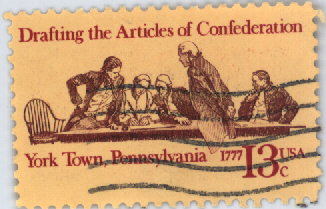FRtR > Outlines > American History (1990) > Chapter Three > Problems confront the new nation (2/11)
An Outline of American History (1990)
Chapter Three
Problems confront the new nation (2/11)
< Previous Page * Next Page >
With the end of the Revolution, the United States again had
to face the old unsolved western question - the problem of
"empire," with its complications of land, fur trade, Indians,
settlement and government of dependencies. Before the war, several
colonies had laid extensive and often overlapping claims to land
beyond the Appalachians. To those without such claims this rich
territorial prize seemed unfairly apportioned.
Maryland, as spokesman of the latter group, introduced a
resolution that the western lands be considered common property
to be parceled by the Congress into free and independent
governments. This idea was not received enthusiastically. Nonetheless,
in 1780, New York led the way by ceding her claims to
the United States. She was soon followed by the other colonies
and, by the end of the war, it was apparent that Congress would
come into possession of all the lands north of the Ohio River and
probably of all west of the Allegheny Mountains. This common
possession of millions of hectares was the most tangible evidence
of nationality and unity that existed during these troubled years
and gave a certain substance to the idea of national sovereignty.
Yet it was at the same time a problem which pressed for solution.
 The Articles of Confederation,
a formal agreement that had
loosely unified the colonies since 1781, offered a solution. Under
the Articles, a system of limited self-government (set forth in the
Northwest Ordinance of 1787)
provided for the organization of
the Northwest Territory, initially as, a single district, ruled by a
governor and judges appointed by the Congress. When this
territory should contain 5,000 male inhabitants of voting age, it
was to be entitled to a legislature of two chambers, itself electing
the lower house. In addition, it could at that time send a non-voting
delegate to Congress.
The Articles of Confederation,
a formal agreement that had
loosely unified the colonies since 1781, offered a solution. Under
the Articles, a system of limited self-government (set forth in the
Northwest Ordinance of 1787)
provided for the organization of
the Northwest Territory, initially as, a single district, ruled by a
governor and judges appointed by the Congress. When this
territory should contain 5,000 male inhabitants of voting age, it
was to be entitled to a legislature of two chambers, itself electing
the lower house. In addition, it could at that time send a non-voting
delegate to Congress.
No more than five nor fewer than three states were to be
formed out of this territory, and whenever any one of them had
60,000 free inhabitants, it was to be admitted to the Union "on
an equal footing with the original states in all respects." Six
"articles of compact between the original states and the people and
states in the said territory" guaranteed civil rights and liberties,
encouraged education, and guaranteed that "there shall be neither
slavery nor involuntary servitude in the said territory."
Thus a new colonial policy based upon the principle of
equality was inaugurated. The new policy repudiated the
time-honored concept that colonies exist for the benefit of the mother
country and are politically subordinate and socially inferior. That
doctrine was replaced by the principle that colonies are but the
extension of the nation and are entitled, not as a privilege but as
a right, to all the benefits of equality. The enlightened provision
of the Ordinance thus laid the basis for America's public land
policy and enabled the United States to expand westward to the
Pacific Ocean and to develop, with relatively little difficulty, from
13 to 50 states.
In the solution of other problems the Articles of
Confederation proved disappointing. A notable shortcoming was their
failure to provide a genuine national government for the 13 states,
which had been tending toward unification since their delegates
first met in 1774 to resist encroaching British power.
< Previous Page * Next Page >
 The Articles of Confederation,
a formal agreement that had
loosely unified the colonies since 1781, offered a solution. Under
the Articles, a system of limited self-government (set forth in the
Northwest Ordinance of 1787)
provided for the organization of
the Northwest Territory, initially as, a single district, ruled by a
governor and judges appointed by the Congress. When this
territory should contain 5,000 male inhabitants of voting age, it
was to be entitled to a legislature of two chambers, itself electing
the lower house. In addition, it could at that time send a non-voting
delegate to Congress.
The Articles of Confederation,
a formal agreement that had
loosely unified the colonies since 1781, offered a solution. Under
the Articles, a system of limited self-government (set forth in the
Northwest Ordinance of 1787)
provided for the organization of
the Northwest Territory, initially as, a single district, ruled by a
governor and judges appointed by the Congress. When this
territory should contain 5,000 male inhabitants of voting age, it
was to be entitled to a legislature of two chambers, itself electing
the lower house. In addition, it could at that time send a non-voting
delegate to Congress.